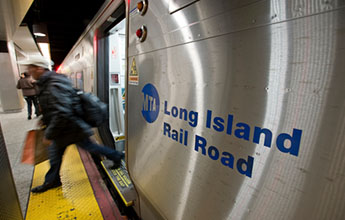
Update -- Tentative Deal Averts
|
 |
With negotiations at a standstill, the Long Island Railroad’s more than 5,000 union workers -- including more than 600 members of Jamaica, N.Y., Local 589 -- are preparing for a strike set for midnight July 20. |
The tide might stop at midnight July 20. After four years of fruitless contract negotiations with the Metropolitan Transit Authority, more than 5,000 workers represented by eight unions, including Local 589, will strike unless a deal is made.
“No one wants a strike, but we have conceded too much already,” said Jamaica, N.Y., Local 589 General Chairman Ricardo Sanchez. “It will be chaos, no matter what time of day, but they’ve left us no choice. Two presidential emergency boards were on our side. The law is on our side. The membership is united. We will not pay for their management incompetence.”
Sanchez said that for four years, the MTA didn’t move from its original position. After no raises for five years, the company still insisted on minimal raises matched with benefits decreases for existing employees. For new employees, the proposal doubled out-of-pocket health care costs, doubled the time to the top salary from five to 10 years and increased employee pension contributions.
“They think we’ll sell out future members because we don’t know them yet, but the membership is rock solid,” said Local 589 President Jeff Klein. “We’ve appointed strike captains and have been telling our members for months to get prepared. They understand what’s at stake and are ready to stay out for as long as it takes.”
A presidential emergency board was convened at MTA’s request in November 2013, and the panel of five arbitrators’ non-binding suggestion was a 17 percent raise over six years, a stair-step increase in employee health care contributions and no change to the pay progression. All eight unions agreed to the recommendation. MTA appealed it. A second PEB met last March. Both sides presented final offers. The unions offered the recommendations of the first PEB, and the new board ruled that the union proposal was the most reasonable.
But for the second time, MTA refused to accept the findings of the review boards it requested.
“Our only choice is to concede or strike and conceding would destroy this job and destroy the union,” Sanchez said. “This is one of the most expensive places to live in the country. If we agreed to these salaries the only electricians we would get are the very desperate or the inexperienced.”
The last strike at the LIRR was over 20 years ago. Then Gov. Andrew Cuomo’s father, Mario, was in office. He stepped in and imposed a deal. Since then, ridership has tripled and the current governor said he will not intervene and enforce the PEB’s recommendation. The MTA’s chairman, Thomas F. Prendergast, visited congressional leaders this week, but they too said they would not intervene.
“They played the time game and time is running out,” said Bill Bohne, director of the IBEW Railroad Workers Department. “The law is on our side. Two emergency boards are on our side. We won’t blink.”
![]()